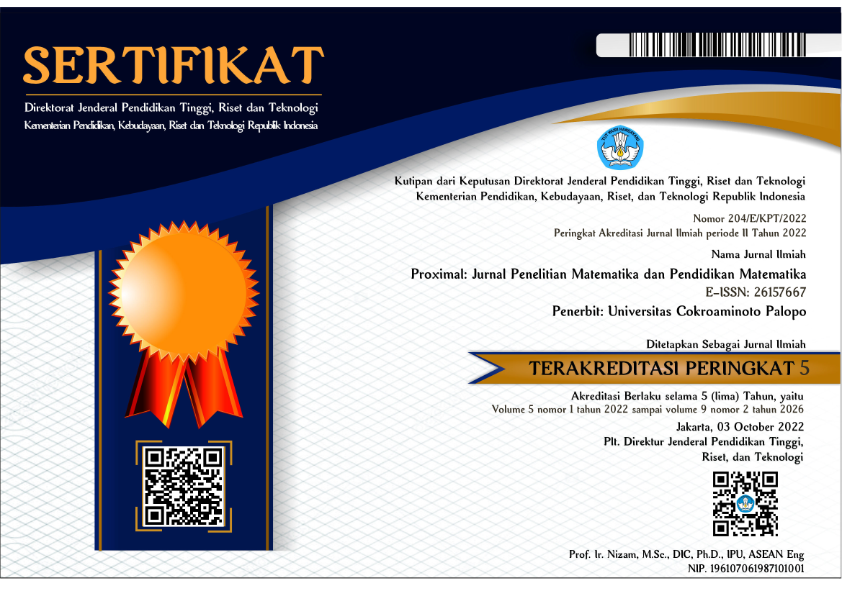Penerapan Pembelajaran Berbasis Masalah: Solusi Peningkatan Kemampuan Pemahaman Konsep Siswa SMA
DOI:
https://doi.org/10.30605/proximal.v7i1.3387Keywords:
Pembelajaran Berbasis Masalah Open Ended, Kemampuan Pemahaman KonsepAbstract
Penelitian ini bertujuan untuk meningkatkan kemampuan pemahaman konsep soswa melalui penerapan pembelajaran berbasis masalah Open Ended pada siswa kelas X KM 5 SMA Negeri 13 Bone. Metode yang digunakan dalam penelitian ini adalah Penelitian Tindakan Kelas (PTK) atau Classroom Action Research (CAR), dilaksanakan dalam dua siklus, yaitu siklus I dan siklus II yang setiap siklus terdiri dari 3 pertemuan pembelajaran dan 1 pertemuan tes. Instrumen penelitian yang digunakan adalah tes soal kemampuan pemahaman konsep, lembar observasi keterlaksanaan pembelajaran (aktivitas siswa dan aktivitas guru) dan angket respons siswa. Subjek dalam penelitian ini adalah siswa kelas X KM 5 sebanyak 36 orang. Hasil dalam penelitian ini menunjukkan bahwa penerapan model pembelajaran berbasis masalah Open Ended pada pembelajaran matematika dapat meningkatkan kemampuan pemahaman konsep siswa di SMA Negeri 13 Bone. Hal ini terlihat dari dari peningkatan skor hasil tes dari siklus I sebesar 76,41 menjadi 89,83 pada siklus II berada pada kategori sangat baik. Untuk persentase aktivitas siswa sebesar 76,71 pada siklus I meningkat menjadi 80,67 pada siklus II berada pada kategori baik sekali. Selain itu, persentase rata-rata respons siswa dari siklus I sebesar 79,66 menjadi 86,63 pada siklus II pada kategori sangat tinggi. Berdasarkan hasil penelitian dapat disimpulkan bahwa penerapan pembelajaran berbasis masalah Open Ended pada pembelajaran matematika dapat meningkatkan kemampuan pemahaman konsep siswa di SMA Negeri 13 Bone.
Downloads
References
Adriani, W., Selaras, G. H., & Yogica, R. (2019). The Identification of Levels of Concept Understanding Using Three-Tier Multiple Choice Diagnostic Test Identifikasi Tingkat Pemahaman Konsep Menggunakan Three-Tier Multiple Choice Diagnostic Test. Atrium Pendidikan Biologi, 1(1), 1–8. DOI: https://doi.org/10.24036/apb.v4i2.5638
Aledya, V. (2019). Kemampuan Pemahaman Konsep Pada Siswa. Researcgate, 2, 1–7.
Arcat. (2017). Pengaruh Model Pembelajaran Kooperatif Teknik Write-Pair-Squar Terhadap Kemampuan Pemahaman. Supremum Journal of Mathematics Education (SJME), 1(1), 1–6. DOI: https://doi.org/10.35706/sjme.v1i1.547
Bil, A., & Marpaung, Q. (2020). Peranan Penting Problem Solving dan kemampuan Visual Thinking Terhadap Peranan Penting Problem Solving dan kemampuan Visual Thinking Terhadap Perkembangan Proses pembelajaran Matematika Siswa. May, 10.
Faridah, N., & Aeni, A. N. (2016). Pendekatan Open-Ended Untuk Meningkatkan Kemampuan. 1(1). DOI: https://doi.org/10.26737/jpmi.v1i1.78
Kurniati, R., & Astuti, M. (2016). Penerapan Strategi Pembelajaran Open Ended Terhadap Kemampuan Berpikir Kritis Siswa pada Mata Pelajaran Matematika Kelas V di Madrasah Ibtidaiyah Negeri 1 Palembang. JIP Jurnal Ilmiah PGMI, 2(1), 1–18. https://doi.org/10.19109/jip.v2i1.1062 DOI: https://doi.org/10.19109/jip.v2i1.1062
Downloads
Published
How to Cite
Issue
Section
License
In submitting the manuscript to the journal, the authors certify that:
- They are authorized by their co-authors to enter into these arrangements.
- The work described has not been formally published before, except in the form of an abstract or as part of a published lecture, review, thesis, or overlay journal.
- That it is not under consideration for publication elsewhere,
- That its publication has been approved by all the author(s) and by the responsible authorities – tacitly or explicitly – of the institutes where the work has been carried out.
- They secure the right to reproduce any material that has already been published or copyrighted elsewhere.
- They agree to the following license and copyright agreement.
License and Copyright Agreement
Authors who publish with this journal agree to the following terms:
- Authors retain copyright and grant the journal right of first publication with the work simultaneously licensed under Creative Commons Attribution License (CC BY 4.0) that allows others to share the work with an acknowledgment of the work's authorship and initial publication in this journal.
- Authors are able to enter into separate, additional contractual arrangements for the non-exclusive distribution of the journal's published version of the work (e.g., post it to an institutional repository or publish it in a book), with an acknowledgment of its initial publication in this journal.
- Authors are permitted and encouraged to post their work online (e.g., in institutional repositories or on their website) prior to and during the submission process, as it can lead to productive exchanges, as well as earlier and greater citation of published work.















